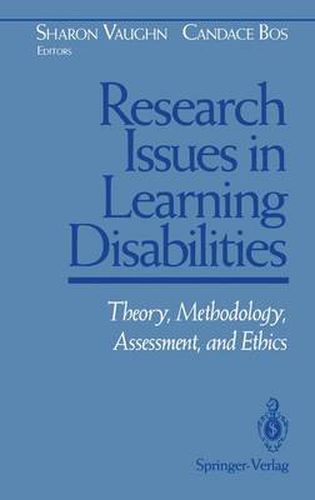Readings Newsletter
Become a Readings Member to make your shopping experience even easier.
Sign in or sign up for free!
You’re not far away from qualifying for FREE standard shipping within Australia
You’ve qualified for FREE standard shipping within Australia
The cart is loading…






This title is printed to order. This book may have been self-published. If so, we cannot guarantee the quality of the content. In the main most books will have gone through the editing process however some may not. We therefore suggest that you be aware of this before ordering this book. If in doubt check either the author or publisher’s details as we are unable to accept any returns unless they are faulty. Please contact us if you have any questions.
In this chapter, we described issues in conducting intervention research with students with learning disabilities on the secondary level. We main tained that interventions should be well-grounded in theories of learning as well as characterizations of learning disabilities (Pressley, Scruggs, & Mastropieri, 1989); that they should first be conducted in a series of highly controlled, laboratory-like experiments to carefully assess the potential utility of the intervention; and that, if the intervention is suc cessful in highly controlled settings, it should then be evaluated in class room applications. We maintained that research designs should evolve as the research questions become more applied, and that the results of laboratory research should be used to support the findings of classroom applications. Finally, we described several research designs that we have found useful in conducting classroom intervention research. There is a great deal more to conducting intervention research, of course, than experimental or quasi-experimental design. Intervention strategies likely to be effective must be identified, relevant literature must be reviewed, experimental materials must be developed, and cooperative schools, teachers, parents, and students must be located. Nevertheless, inadequate research designs can invalidate the best and most successful efforts in all of these areas, while effective and practical research designs can do much to document the best practices and advance our knowledge of effective interventions with students with learning disabilities. References Brigham, F. J. , Scruggs, T. E. , & Mastropieri, M. A. (1992).
$9.00 standard shipping within Australia
FREE standard shipping within Australia for orders over $100.00
Express & International shipping calculated at checkout
This title is printed to order. This book may have been self-published. If so, we cannot guarantee the quality of the content. In the main most books will have gone through the editing process however some may not. We therefore suggest that you be aware of this before ordering this book. If in doubt check either the author or publisher’s details as we are unable to accept any returns unless they are faulty. Please contact us if you have any questions.
In this chapter, we described issues in conducting intervention research with students with learning disabilities on the secondary level. We main tained that interventions should be well-grounded in theories of learning as well as characterizations of learning disabilities (Pressley, Scruggs, & Mastropieri, 1989); that they should first be conducted in a series of highly controlled, laboratory-like experiments to carefully assess the potential utility of the intervention; and that, if the intervention is suc cessful in highly controlled settings, it should then be evaluated in class room applications. We maintained that research designs should evolve as the research questions become more applied, and that the results of laboratory research should be used to support the findings of classroom applications. Finally, we described several research designs that we have found useful in conducting classroom intervention research. There is a great deal more to conducting intervention research, of course, than experimental or quasi-experimental design. Intervention strategies likely to be effective must be identified, relevant literature must be reviewed, experimental materials must be developed, and cooperative schools, teachers, parents, and students must be located. Nevertheless, inadequate research designs can invalidate the best and most successful efforts in all of these areas, while effective and practical research designs can do much to document the best practices and advance our knowledge of effective interventions with students with learning disabilities. References Brigham, F. J. , Scruggs, T. E. , & Mastropieri, M. A. (1992).